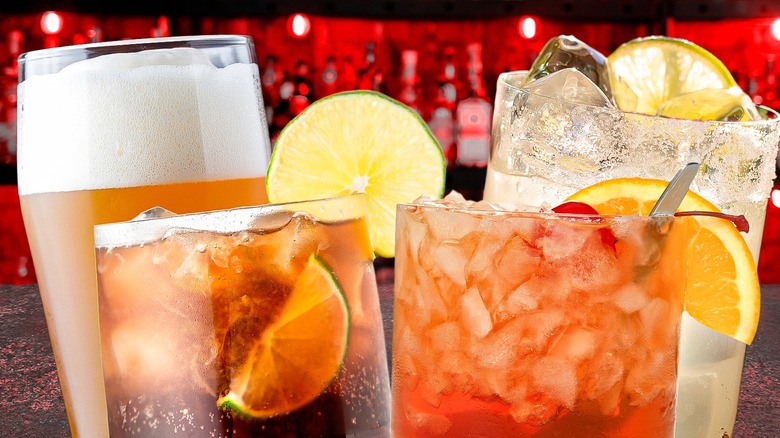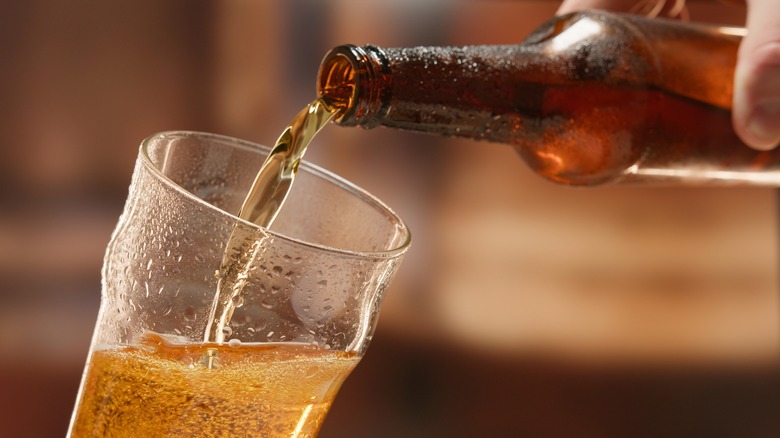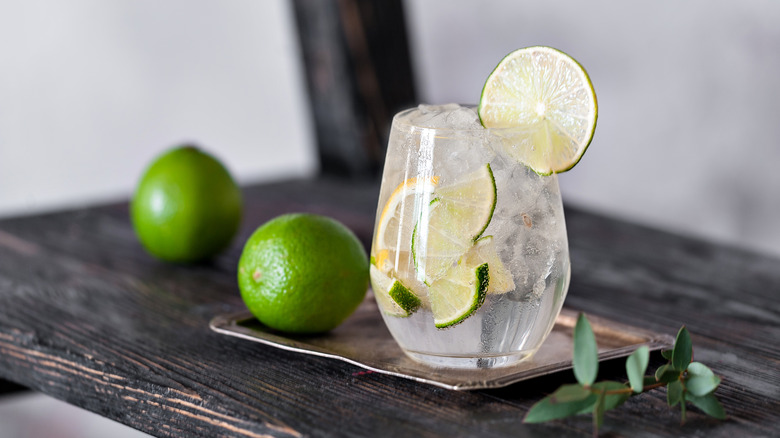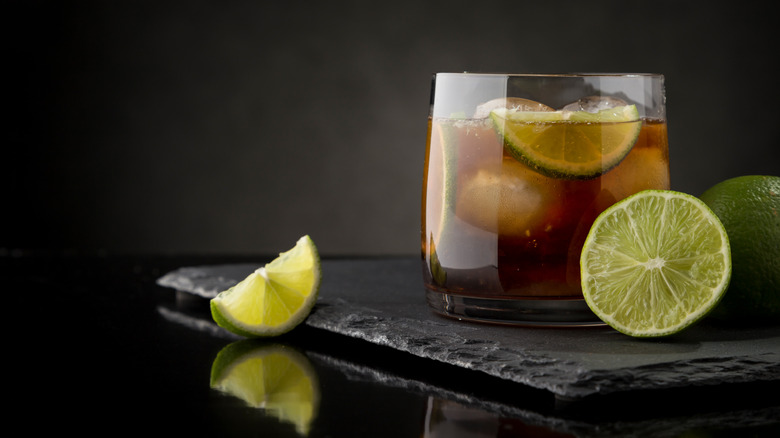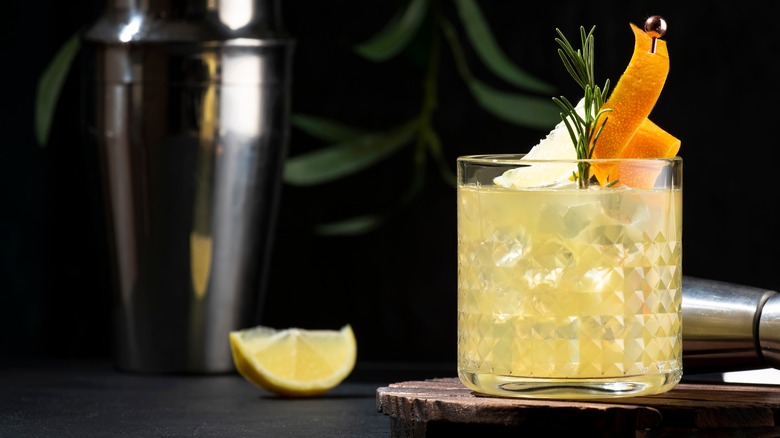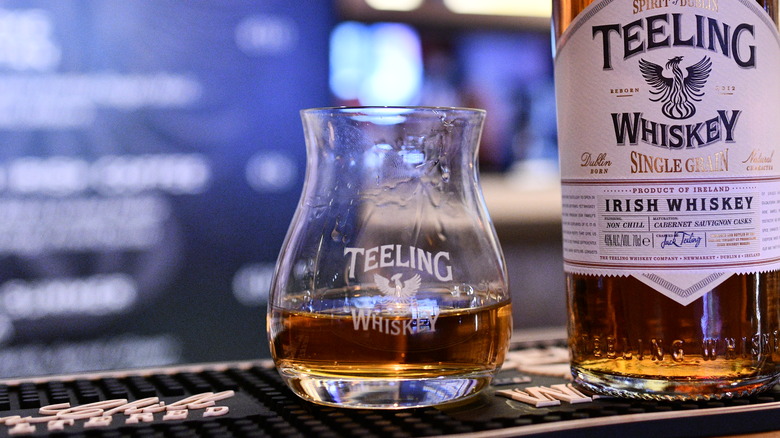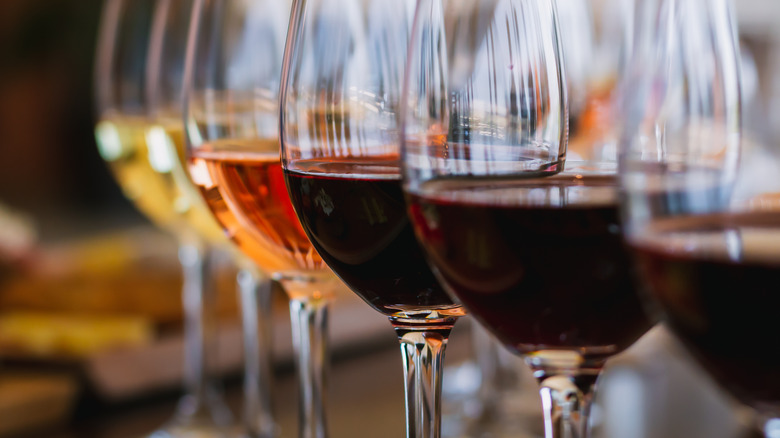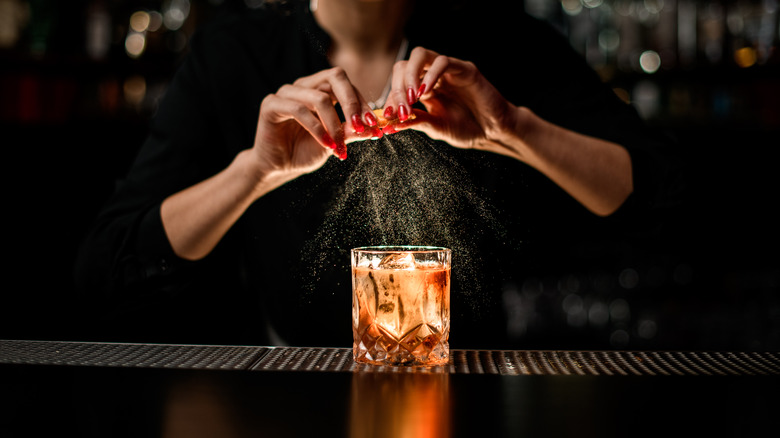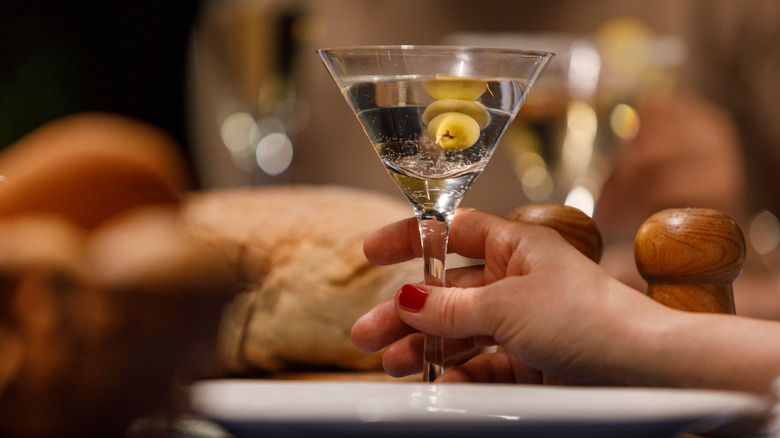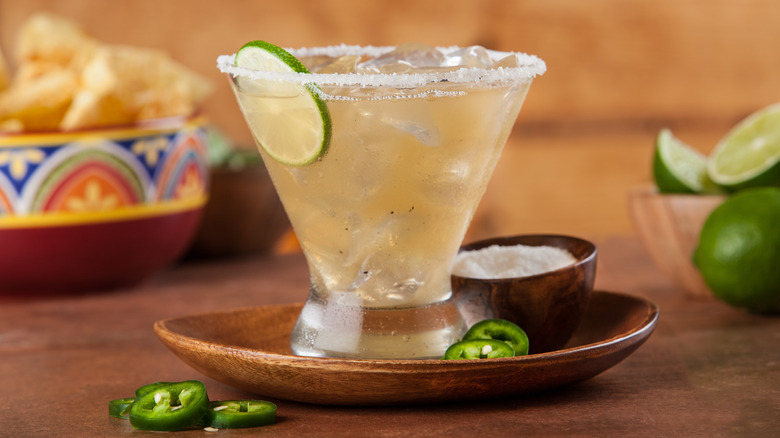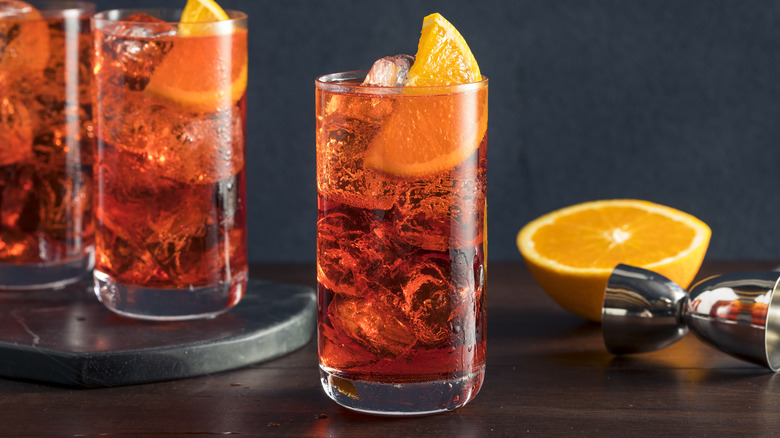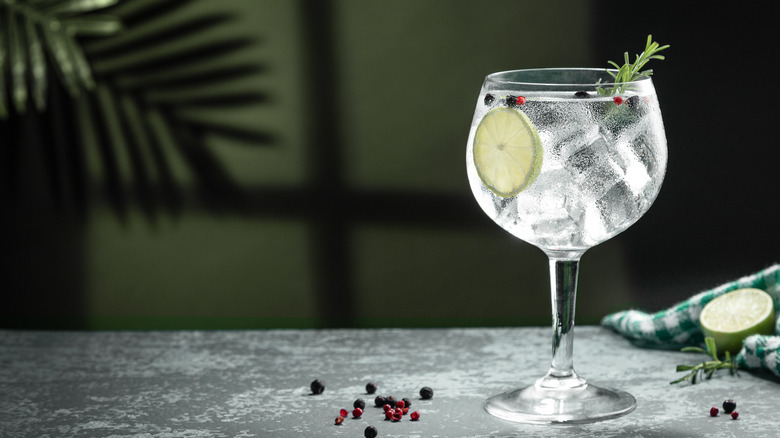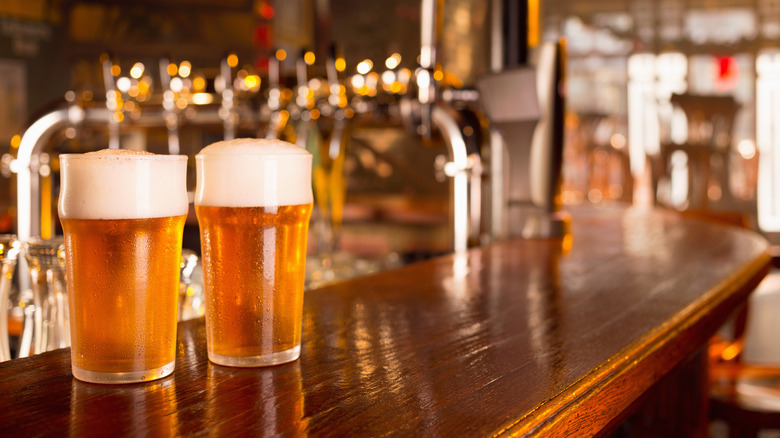13 Safest Drinks To Order At A Dive Bar
There comes a time when, for whatever reason, we find ourselves in a dive bar, wondering what drinks we can trust. Being a "dive" doesn't necessarily reflect the quality of a bar's drinks — I've managed a few myself that wouldn't be considered objectively bad — but there are plenty that don't pass muster. Fortunately, there are several go-to beverages I know I can turn to if an establishment doesn't live up to my standards.
You might be able to tell from the menu — if they have one — that their drinks are overpriced or their selection is limited, and a glance at the back bar should let you know what kind of ingredients they have. Even a well-stocked bar might employ staff with poor drinks knowledge, and while we can never judge someone's expertise based on their appearance, it only takes a few questions to tell if the bartender knows their stuff. They could also be the world's greatest "mixologist," but that doesn't matter if the bar's service is painfully slow; although, bear in mind that this isn't necessarily the staff's fault.
Lastly, few of us like to drink at an unhygienic bar with filthy floors, sticky tables, and dirty glassware. Generally, bars that don't keep the front of house in good shape or clean their restrooms won't be looking after areas the customer can't see.
Beer
If a bar has a limited selection of spirits, wines, and cocktail ingredients on the back bar but plenty of beer taps, it's a good indicator that they're used to serving draft beer. Bars that serve a lot of draft beer usually go through kegs faster, which means you're more likely to get a fresher drink.
It's also more likely that the bar knows how to store their kegs properly, cleans their lines at regular intervals, and keeps their glassware "beer clean." A range of local or craft beers is also a positive sign that the proprietor takes pride in their beer offering. However, the exception is if you find yourself in an unhygienic establishment with bar flies hovering around the beer taps, dirty glassware, and the unmistakable odor of stale beer in the air.
Pouring quality beer requires a lot of attention to cleanliness — all the way from the keg to the glass — so when in doubt, go for a bottle or can instead. If the glassware looks clean enough, ask for an empty glass as well, because you don't know where the bottle or can was stored before it was put in the fridge. Prepackaged beer is also the best pick if service is slow, as it's the quickest and easiest drink a bartender can get you.
Vodka soda
Whichever bar you find yourself in, it's really hard to go wrong with vodka. Being a diluted neutral grain spirit, any imperfections in low-quality vodka aren't nearly as noticeable as other liquors, particularly when you add another ingredient to mask the taste.
Almost any mixer will do, but if you're not a fan of sweet and sugary drinks, soda water is usually your best bet. Not only is it light and refreshing, but vodka soda is one of the lowest-calorie alcoholic beverages around, and by staying somewhat hydrated, you're in a better position to drink responsibly and avoid a hangover the next day.
Bear in mind that many bars use soda guns for their carbonated mixers, and these require regular cleaning or they can get gross pretty quickly. If you're in a place that's in need of a good scrubbing, ask if they have bottled soda for mixing to avoid contamination from dirty equipment. If you think you can trust the fruit, a wedge or two of lime is the perfect addition to a vodka soda; if not, ask for a drop or two of lime cordial instead.
Rum and Coke
Like vodka, even the roughest rums can be made palatable with a basic mixer, and it's rare that you'll find a bar that doesn't have at least one white and one dark rum in stock.
While white rums are aged for less time than dark rums, making them more neutral in flavor, both have a sweetness that makes them perfect for pairing with Coke, a soda robust enough to mask the worst of a rum's qualities. If you've got more of a sweet tooth, you can always pick a spiced rum, as it's a relatively consistent and inexpensive style that's found its way into most bars.
Add a few wedges of lime to your rum and coke and you've got yourself a Cuba Libre cocktail, and the fresh citrus will cut through the sweetness of the spirit and the soda. If you're not a fan of Coca-Cola, ginger beer is an excellent alternative if the bar has it available, and if they're able to add a few dashes of Angostura bitters, you're basically drinking a Dark 'n Stormy.
Bourbon
When it comes to ordering a drink you can trust at a dive bar, bourbon is usually a safe choice. There plenty of excellent-value bourbons around. Even dive bars with the most basic menu selection should at least stock one reliable mainstream brand.
Bourbon is on the sweeter, smoother side, especially when compared with other whiskey styles, as it's predominantly corn-based, so even the cheap stuff should be pretty palatable. There's also the fact that there are stringent rules around bourbon production so while they certainly vary in quality, there aren't many that are truly awful. Generally, the worst that'll happen is you'll end up with a bourbon that tastes too "hot" with an overly prominent alcohol burn — or one that's too thin and watery with flavors that come and go before you can enjoy them.
If you prefer your bourbon neat, an ice cube or two will reduce the heat of one that's a little too strong, making it easier to sip. If you're facing a weak-flavored bourbon or neat whiskey just isn't your thing, go for a mixer like lemonade, cola, soda, or ginger ale.
Scotch and ginger ale
While bourbon is generally palatable across the board, the same can't necessarily be said for scotch whisky. That doesn't mean there aren't some great value scotches out there, it's just the nature of the whisky's style and production method.
First, if you're in a dive bar then it's unlikely you're going to find a reasonably priced, high-quality single malt scotch, which means you'll be choosing from a range of blended scotches. It's also worth remembering that scotches age more slowly than bourbon due to the cooler Scottish climate. Unsurprisingly, Kentucky is warmer than Aberdeen, so a three-year-old bourbon is likely going to taste smoother and have more flavor than a three-year-old scotch. Lastly, the flavors in scotch can vary dramatically depending on the distillery and the region it's produced in, so it can be a bit of a gamble if you don't recognize the brand on the shelf.
However, this is where a nice dry ginger ale comes in. It's the perfect mixer for scotch because not only is it usually powerful enough to mask imperfections in the liquor, but its flavor profile makes it extremely versatile. An unfamiliar scotch could be varying degrees of peaty, smoky, floral, or fruit-forward, and ginger ale will work with any of its potential characteristics.
Irish whiskey
Although Irish whiskey isn't predominantly corn-based like bourbon, the cheaper varieties have a smoothness to them that scotch whiskies normally can't match. This is thanks to the fact Scotch is double-distilled, whereas Irish whiskeys are triple-distilled.
Ultimately, triple-distilled whiskeys are smoother than those that are double-distilled because the process filters out more unwanted flavor compounds in the spirit. As a result, cheaper Irish whiskeys are generally fairly easy-drinking, and there's more consistency taste-wise. That's not to say Irish whiskeys don't vary, it's just that you're more likely to be comparing dried fruit notes against orchard fruit characteristics. With Scotch, there's a chance it could end up tasting like a seaside campfire. Again, that's not necessarily a bad thing, but probably not a taste you want to be surprised with.
While most Irish whiskeys go down well enough neat or with a couple of ice cubes, they also work with the majority of mixers. In fact, if you find bourbon too sweet, Irish whiskey is a great alternative.
Wine
As a rule, wine isn't the best choice of drink if you're at a dive bar when quality can vary and it's hard to guarantee freshness. However, if wine is your go-to tipple, there are still a few ways you can get a serviceable glass.
The first thing to consider is freshness. Even reputable bars sometimes push the limits of how long they keep opened bottles of wine to reduce waste. However, this is only an issue for wines served by the glass, so if you've got someone to share with, go for a bottle. You might be able to take an unfinished bottle home with you, but this can depend on the bar's licensing rules, and in some places, it's illegal to travel with unsealed alcohol containers in a vehicle.
If you have to buy wine by the glass, you're generally safer picking the house offering. Although the quality might be lower, it'll probably be the bar's biggest seller, meaning they open fresh bottles more often and might not mind if you ask them to open a new one. In terms of quality, a chilled white wine, maybe with some ice, will taste smoother and won't show imperfections as obviously as room-temperature red.
Old Fashioned
If you're determined to drink something a little fancier, there are a handful of cocktails that even an inexperienced bartender with limited ingredients should be able to handle. An Old Fashioned, for example, is ultimately just bourbon, sugar, and bitters.
The only way the bartender can really get it wrong — aside from messing up the three simple ingredients — is over-diluting the drink by stirring it for too long. If you're concerned that's going to happen, simply ask them to combine the ingredients in the glass with fresh ice. This way, you can just stir the cocktail yourself until it's mixed to your preferred strength.
Although most bartenders probably won't mind you asking for something they haven't heard of, try not to overwhelm anyone who's already struggling to keep up with service. In fact, it's a good idea to avoid cocktails altogether if you can tell the bar is busier than usual. This goes double for bars with table service, as your server might happily accept your order, while the person left to make it may have no idea what you're asking for.
Martini
Like an Old Fashioned, a martini is a relatively simple cocktail to make, consisting of only dry vermouth, and vodka or gin. While not every bar will have olives for a garnish, most should be able to handle a twist of lemon peel.
However, unlike an Old Fashioned, a martini is served straight up, so you're going to need to trust your bartender to stir it for the right amount of time before they strain out the ice. It's also usually worth mentioning to them that you'd like the martini stirred — inexperienced bartenders tend to assume a martini should be shaken, a common misconception, thanks to James Bond. Shaking means you're more likely to end up with pieces of ice in your cocktail and makes it easier to over-dilute.
However, before you order, make sure you can see where the bar stores their vermouth before they pour it. As a fortified wine, it should be refrigerated to prevent oxidation and keep it from spoiling — again, even good bars get this wrong relatively frequently.
Margarita
Another classic, most bartenders with basic cocktail knowledge and a reasonably-stocked bar should be able to throw you together a margarita. Tequila, triple sec, lime juice, and sugar are all they really need to have on hand.
The quality of the tequila doesn't matter too much, as the lime cuts through most of it, and there's not really such a thing as "bad triple sec." As long as the bartender gets the measures right and doesn't overshake, they should be able to make a reasonable marg. Even if the bar just adds tequila to a pre-made margarita mix, you should end up with a passable cocktail.
If your cocktail's balance isn't quite right — it's too sweet or sour — you can always ask the bartender for an extra dash of lime juice or sugar syrup to even things out. If your margarita tastes too strong, an ice cube will dilute it a little to make it more palatable.
Americano
While the two are easily confused, in this case, we're talking about the classic cocktail, not the coffee. The Americano is a wonderfully refreshing yet bitter cocktail that most bars should be able to make, as it also requires little in the way of ingredients.
An Americano consists of Campari, sweet vermouth, and soda water, so it's perfect if you love a Negroni but don't quite trust the bartender's mixing skills. Rather than carefully diluting an Americano by stirring it down over ice, the Campari and vermouth are simply poured into a hi-ball glass full of ice, topped with soda, and given a gentle mix.
You shouldn't run into any freshness issues with the Campari or soda water, but like with the martini, you'll want to scope out where they're keeping their vermouth. If it's pulled off the back bar instead of from the fridge, go for something else instead.
Gin and tonic
Out of all the drinks to choose from at a dive bar, a gin and tonic is usually the number one pick. For starters, you'd have to be in a uniquely unequipped establishment if they can't rustle up a G&T.
Although gin can have a huge range of flavors and styles, there aren't really any that won't pair with tonic. Of course, some gins match up better with specific types of tonic, but in this scenario, it's unlikely you can be fussy. In fact, you're more likely to run into a gin you don't like at a place that specializes in unique varieties, as a basic bar is probably going to only stock popular brands that you can trust.
The bitter quinine in tonic will hide imperfections in almost any gin, but if you can trust the freshness of the bar's fruit, it's worth adding a wedge of lemon, lime, or even orange. Citrus will lift the juniper and bring all the flavors together, while also masking characteristics that are too harsh. A gin and tonics is also incredibly quick and easy to make, so it's another great option if you can tell the bartender is slammed and you don't want to wait too long for your drink.
The bartender's choice
If you get to the bar and find yourself completely stumped as to what to order, or you haven't had enough time to assess the place's quality, you can always put your faith in the person behind the bar. A simple, "What do you recommend?" should do the trick.
Hopefully, the bartender will know which drinks to avoid based on quality and hygiene, even if they can't say it out loud, and point you in the right direction. You can also ask simple questions like, "Can you tell me about the beers you have on tap?" or "Which is your favorite wine?" Even if the bartender has a complete lack of product knowledge, it can give you a hint as to what you should avoid. For example, if the staff knows nothing about any of the beers they serve, what are the chances the bar cleans its lines properly?
However, this is another occasion where it's best to save questions and recommendation requests for an empty bar. If the bartender's under pressure, they probably don't have time to answer you properly and might just suggest whatever makes their life easiest. If you have to stand in line to get to the bar, you should have enough time and options to figure out what to order by the time it's your turn.
Methodology
The choices above are based on my personal experience in both the hospitality industry and as an on-trade alcohol sales representative. My work in bar management took me behind the scenes of countless establishments, many of which needed help fixing the types of issues I've covered above — if a customer asked me what drink I'd recommend, it would always be one of those listed. As a sales rep, I'd visit dozens of venues every week of varying degrees of quality, so I'm intimately familiar with navigating dive bars and finding out which of their offerings are palatable. In my personal and professional opinion, there's always something drinkable if you know what to look for and what to avoid.
